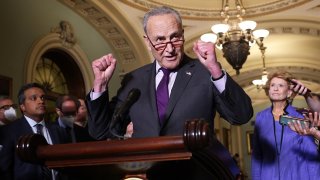
- The Senate approved a budget resolution, the first step toward Democrats passing a $3.5 trillion spending plan without Republican votes.
- The party sees the plan as complementary to the more than $1 trillion bipartisan infrastructure plan passed by the Senate on Tuesday.
- Congress likely will not pass either bill for weeks or even months.
Senate Democrats took their first step toward passing a $3.5 trillion spending plan early Wednesday as the party forges ahead with a massive economic agenda.
After more than 14 hours of votes on amendments, the Democratic-held chamber voted to pass a budget resolution 50-49 along party lines. The measure directs committees to craft a bill that would spend up to $3.5 trillion on climate initiatives, paid leave, child care, education and health care.
Get Boston local news, weather forecasts, lifestyle and entertainment stories to your inbox. Sign up for NBC Boston’s newsletters.
"The Democratic budget will bring a generational transformation to how our economy works for average Americans," Schumer said after its passage.
It marks the first step in the budget reconciliation process, which will allow Democrats to approve their plan without a Republican vote in the Senate split 50-50 by party. The GOP has united against the proposal and the tax increases on corporations and wealthy individuals that Democrats plan to use to pay for it.
The vote for the resolution follows Senate passage of a $1 trillion bipartisan infrastructure bill Tuesday. Democrats see the bipartisan plan and their reconciliation bill as complementary planks of an agenda that aims to create jobs, slow climate change and strengthen the social safety net.
Money Report
Early signs of trouble emerged for Democrats, who have to keep every member of their Senate caucus on board to pass their spending plan. Sen. Joe Manchin, D-W.V., raised concerns about the $3.5 trillion price tag and signaled he would try to scale back the final legislation.
"Given the current state of the economic recovery, it is simply irresponsible to continue spending at levels more suited to respond to a Great Depression or Great Recession – not an economy that is on the verge of overheating," he said in a statement.
Neither bill will get to President Joe Biden's desk for weeks or even months. The House will also need to approve a budget resolution before Congress can craft and pass final legislation.
Balancing competing interests in her caucus, House Speaker Nancy Pelosi, D-Calif., has said she will not take up the infrastructure or reconciliation bills until the Senate passes both of them. However, she has faced some pressure from centrists in her party to hold a stand-alone vote on the bipartisan plan.
House Majority Leader Steny Hoyer announced Tuesday that the chamber will return from its current recess on Aug. 23, about a month earlier than previously planned. The House will move to pass the budget resolution, the Maryland Democrat said.
The Senate is set to leave Washington until mid-September.
Senate Majority Leader Chuck Schumer, D-N.Y., gave committees a Sept. 15 target to put together their portions of the bill.
The resolution seeks to expand paid family and medical leave, make child care more accessible, create universal pre-K and tuition-free community college, and extend enhanced household tax credits passed during the coronavirus pandemic. It also recommends lowering the Medicare eligibility age and expanding benefits to include dental, vision and hearing.
The measure also calls for expanding green energy and curbing climate change through business tax incentives, consumer rebates and polluter fees.






